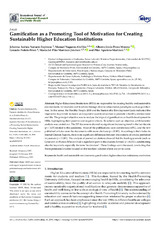Gamification as a Promoting Tool of Motivation for Creating Sustainable Higher Education Institutions
Autor
Navarro-Espinosa, Johanna Andrea
Vaquero Abellán, Manuel
Perea Moreno, Alberto Jesús
Pedrós Pérez, Gerardo
Martínez-Jiménez, Pilar
Aparicio-Martínez, Pilar
Editor
MDPIFecha
2022Materia
Health and sustainable environmentsGamification
Higher education institutions
Motivation
METS:
Mostrar el registro METSPREMIS:
Mostrar el registro PREMISMetadatos
Mostrar el registro completo del ítemResumen
Higher Educational Institutions (HEIs) are responsible for creating healthy and sustainable environments for students and teachers through diverse educational paradigms such as gamification. In this sense, the Healthy People 2030 and the Sustainable Development Goals indicated the imperative to provide inclusive and equitable quality education to promote a healthy environment and life. The principal objective was to analyse the impact of gamification on health development in HEIs, highlighting their positive and negative effects. To achieve such an objective, a bibliometric analysis was carried out. The 257 documents showed no significant increasing trend in the last decade (p > 0.05) related to the pandemic. Most of the publications were conferences (45%), and the few published articles were the documents with more citations (p < 0.001). According to their index in Journal Citation Reports, there were significant differences between the citations of articles published in journals (p < 0.001). The analysis of journal co-citations showed that the leading journals (such as Computers in Human Behavior) had a significant part in the clusters formed (p < 0.001), conditioning also the keywords, especially the term “motivation”. These findings were discussed, concluding that the experimental studies focused on the teachers’ adverse effects are yet to come.

